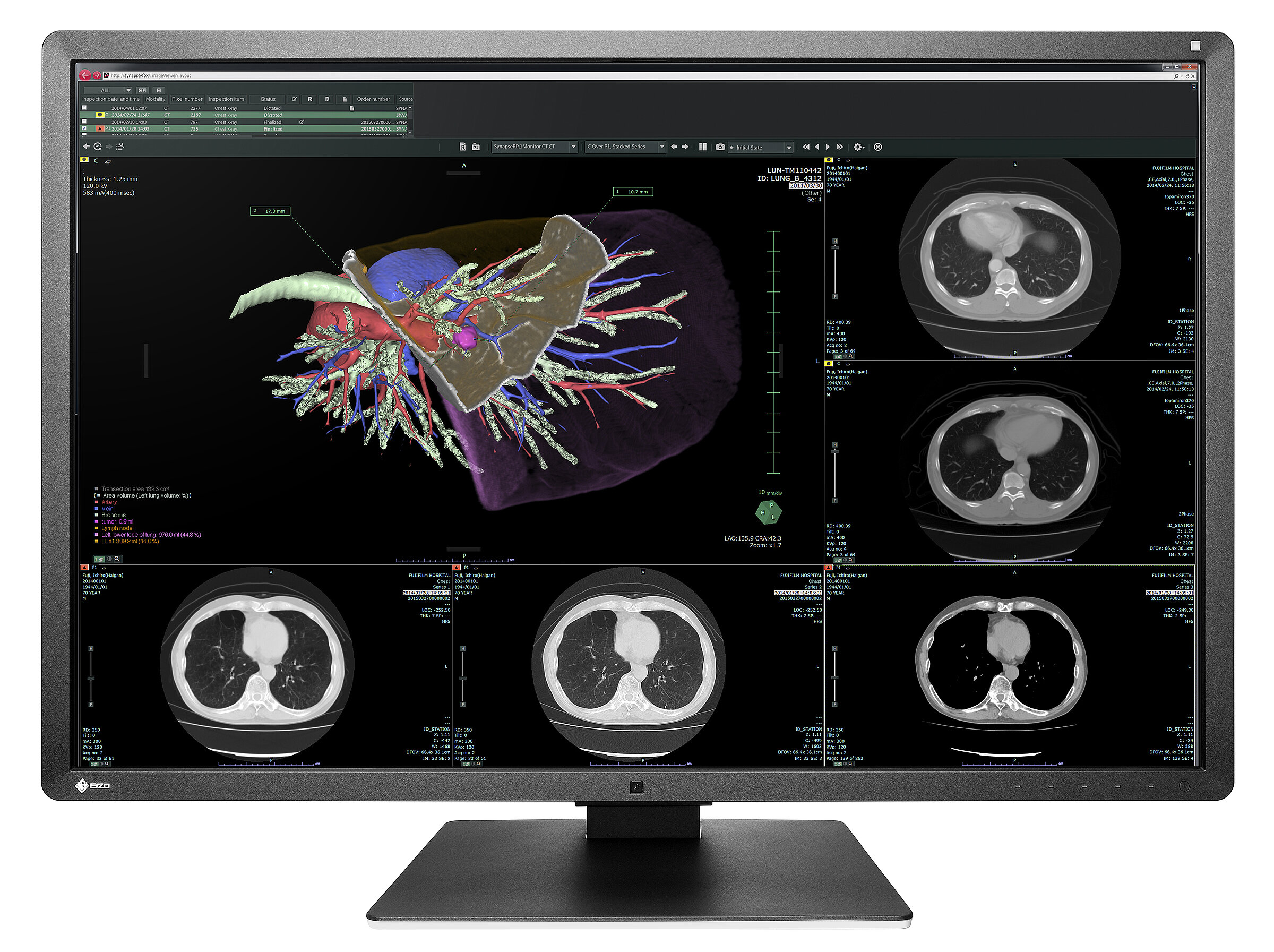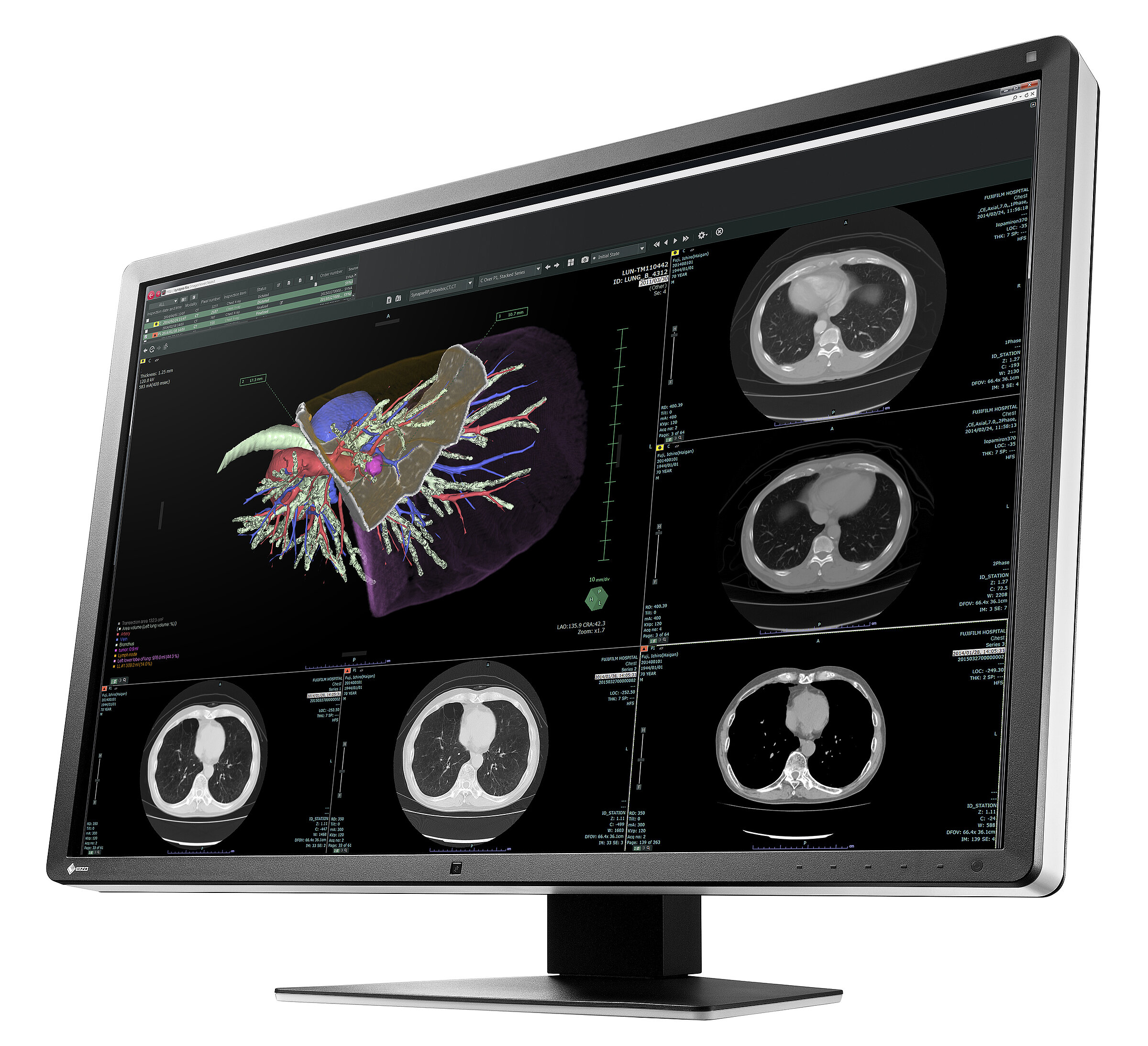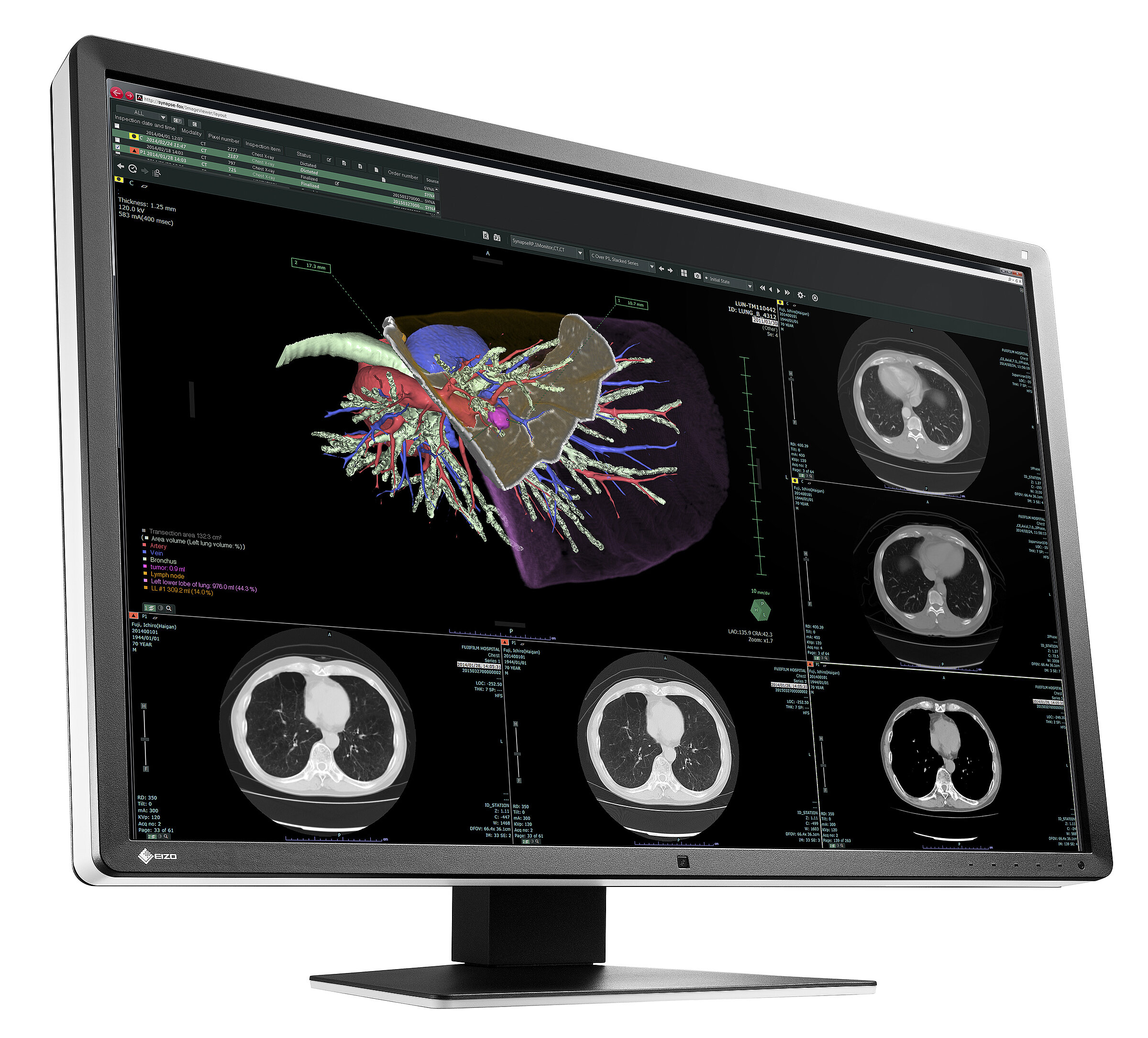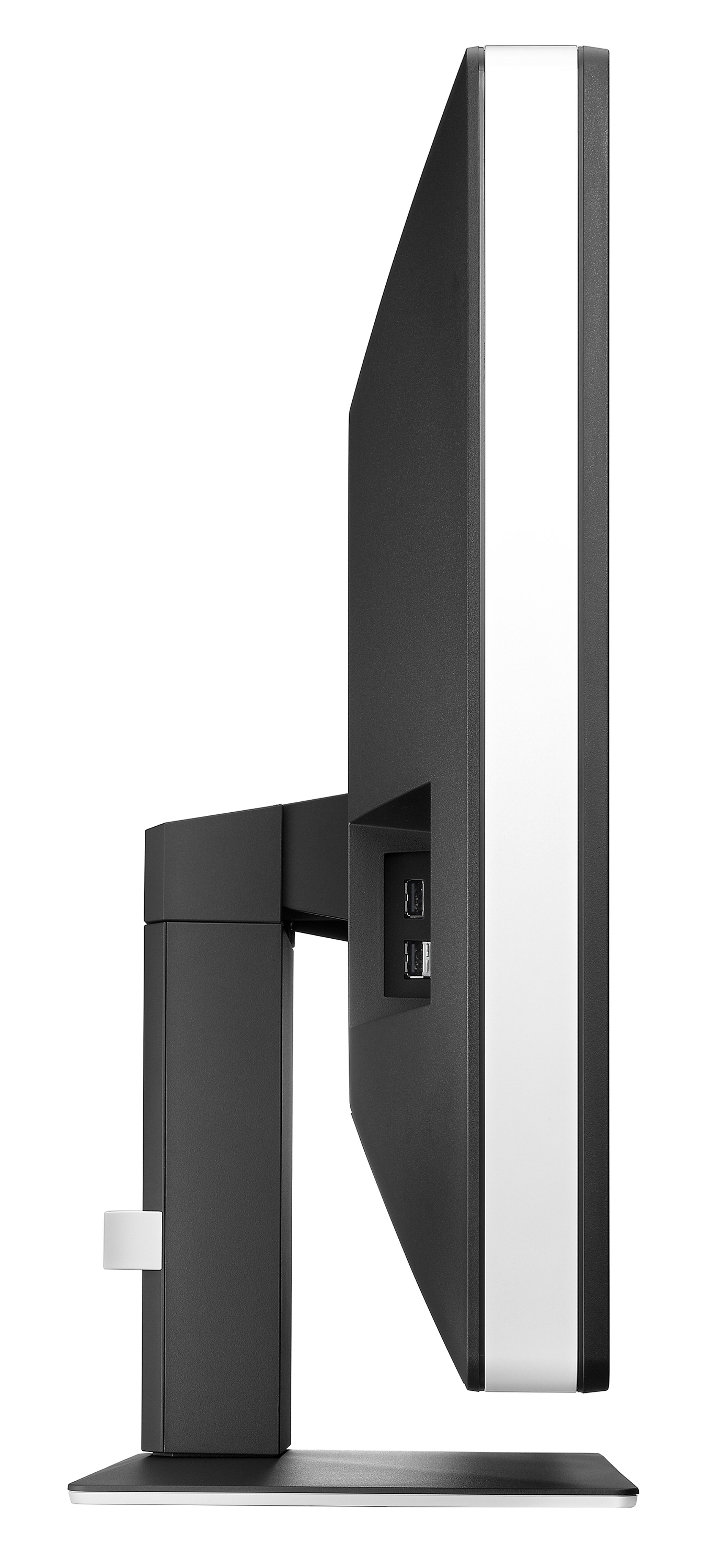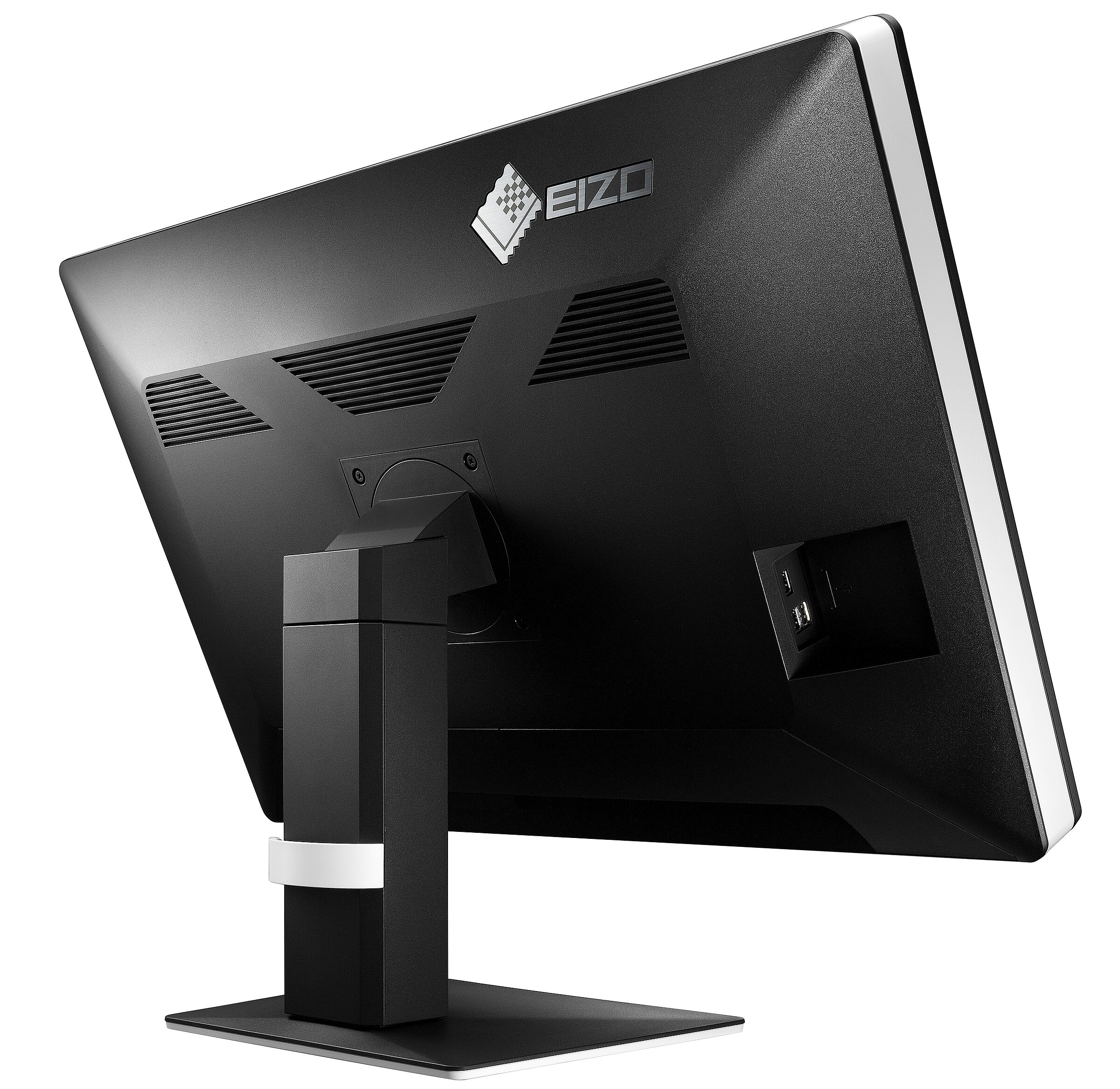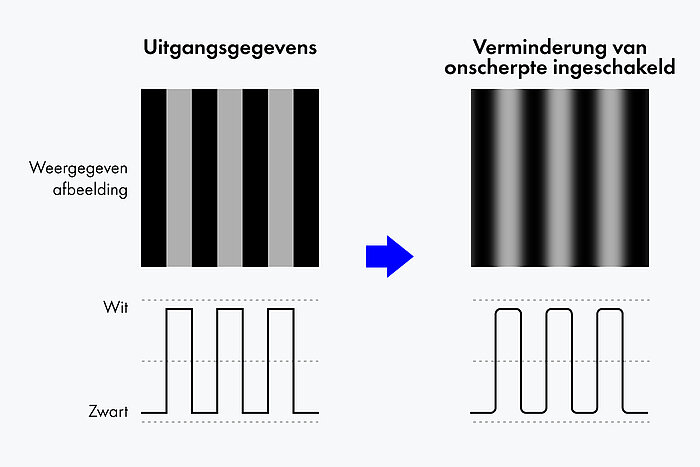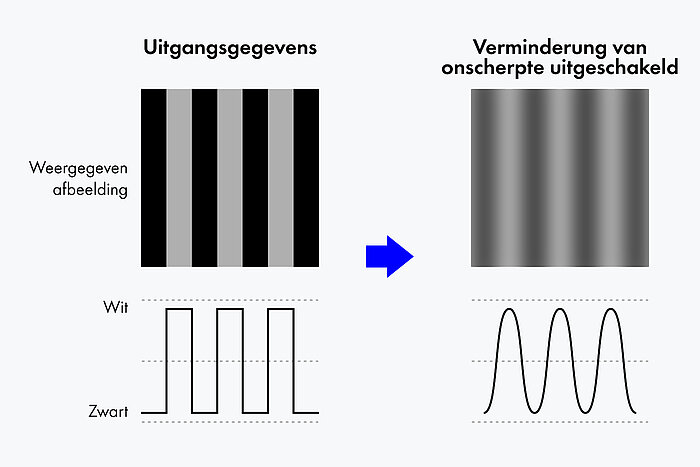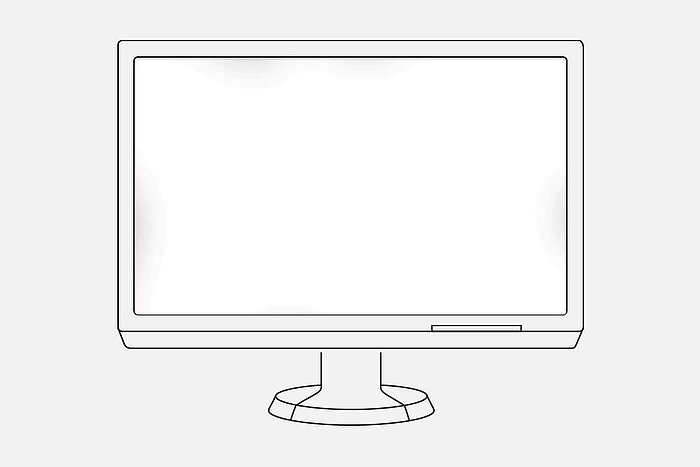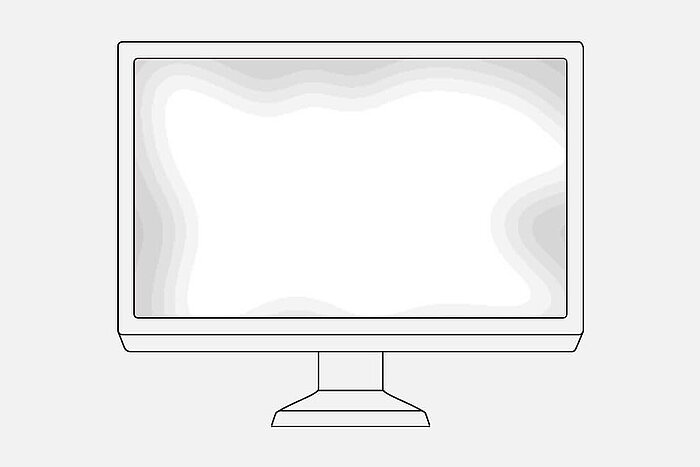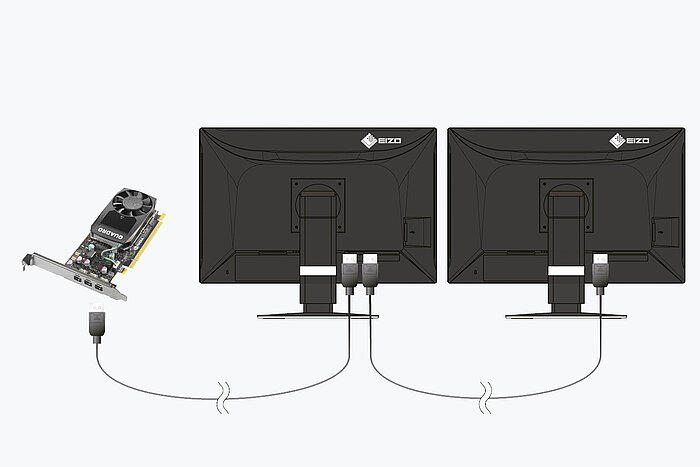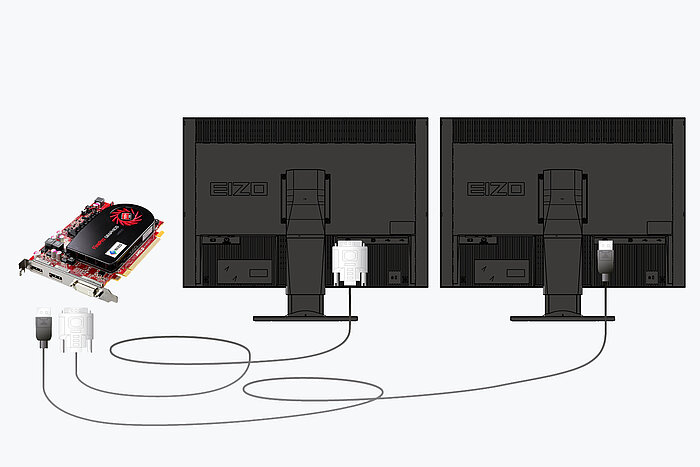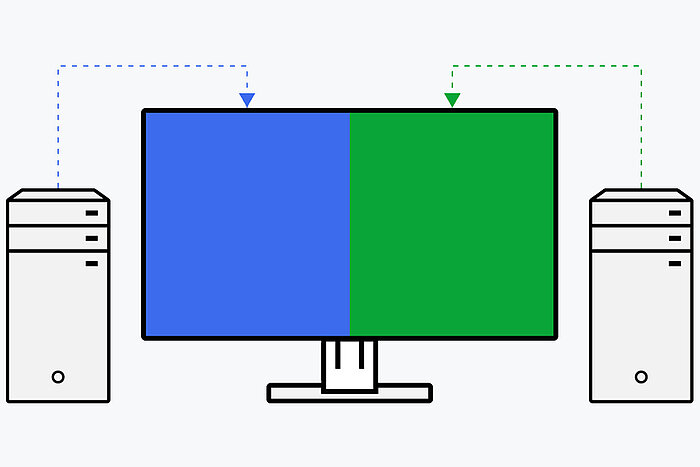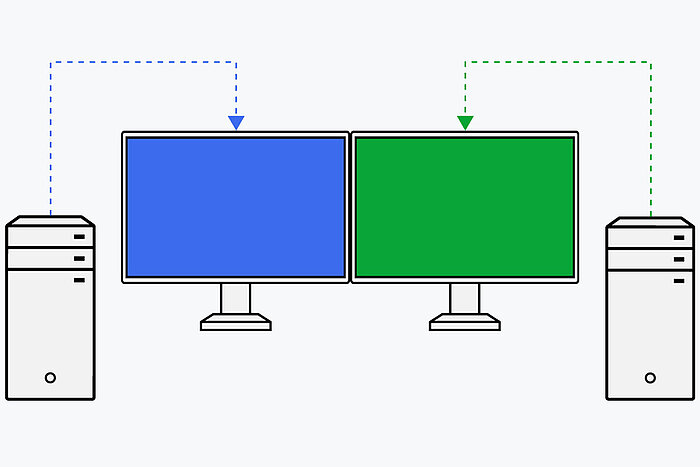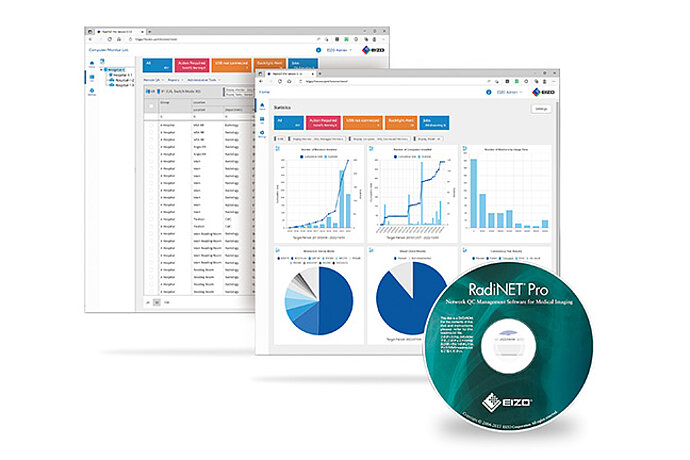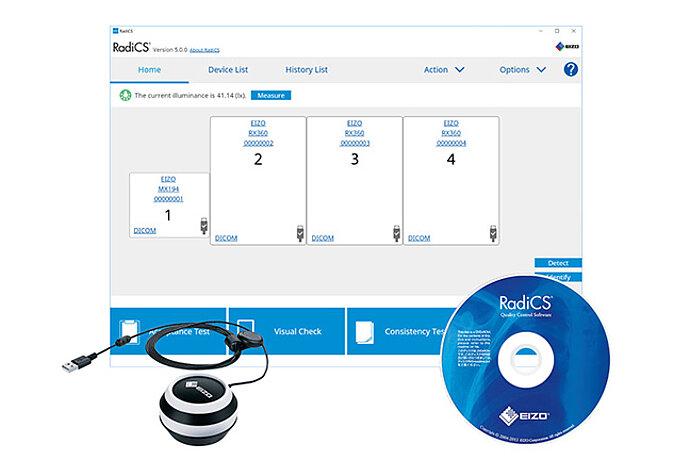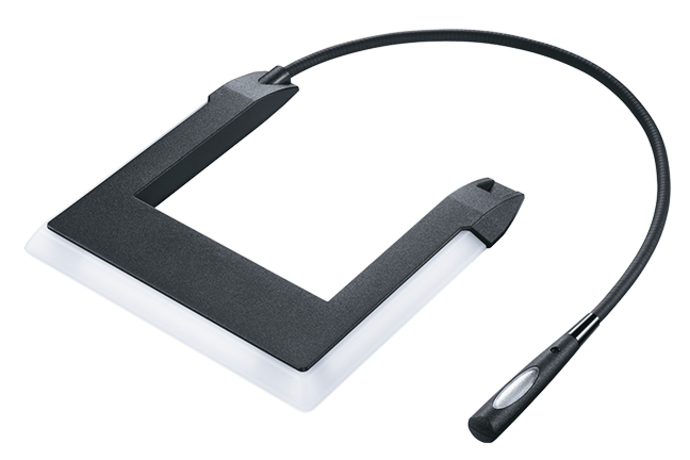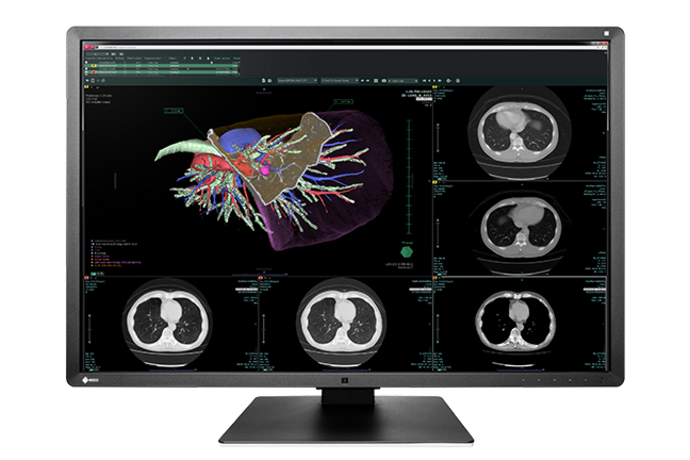RX660 RadiForce
Schermgrootte en resolutie maken een flexibele beeldindeling naar eigen inzicht mogelijk. De RX660 bespaart bovendien meer ruimte dan systemen met twee monitoren met ieder 3 megapixels.
- 76 cm (30")
- 6 Megapixels (kleuren)
- 16:10 Formaat
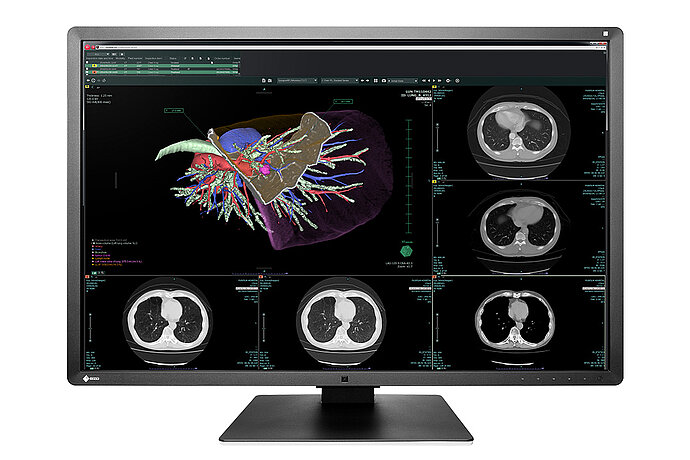
Beeldkwaliteit
Nauwkeurigheid, helderheid, contrast en scherpte
Dankzij een hoge resolutie van 6 Megapixels (kleuren), een sterke contrastverhouding van 1500:1 en een stabiele helderheid van tot maar liefst 1000 cd/m2 biedt de monitor een excellente beeldkwaliteit. Zelfs de kleinste details worden gedifferentieerd weergegeven, onafhankelijk van de kijkhoek van waaruit de monitor wordt bekeken. Dit is een groot voordeel als meerdere artsen het beeldscherm bekijken.
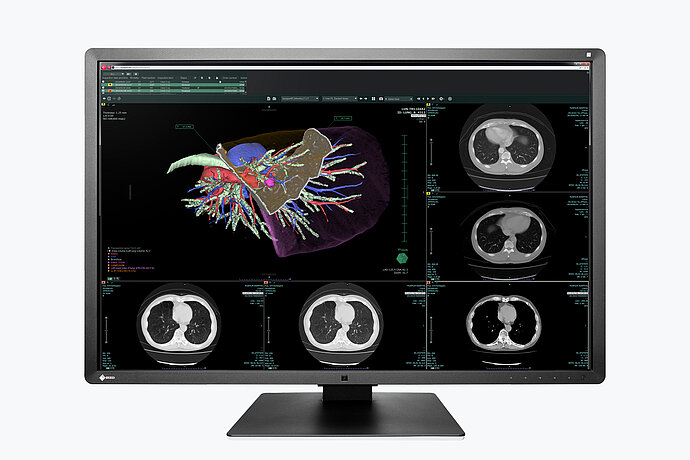
Consequente borging van de beeldkwaliteit
De optionele EIZO-software RadiCS voor borging van de beeldkwaliteit maakt uitgebreid onderhoud en onderzoek aan monitoren mogelijk. Deze software dekt alle stappen af, van de kalibratie via de overdrachts- en stralingstest tot de archivering. Als u met meerdere monitoren werkt, adviseren wij het gebruik van de software RadiNET Pro. Via deze software wordt de kalibratie van alle monitoren inclusief datahistorie centraal aangestuurd. Zo bespaart u veelt tijd en beschikt u voor het hele systeem over een uniform hoge beeldkwaliteit. De basisversie RadiCS LE - zonder acceptatie- en bestendigheidstesten - wordt al meegeleverd met de RadiForce-monitoren.
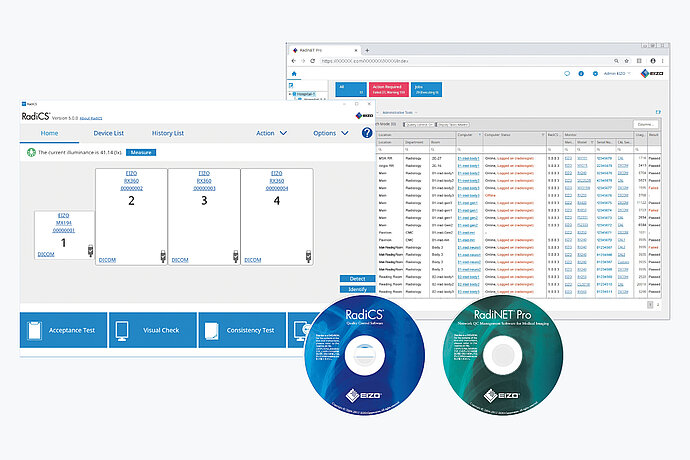
Eén miljard kleuren dankzij 13-bit-LUT
De kleurweergave gebeurt via een 13-bit-Look-Up-Table (LUT). Bij een DisplayPort-aansluiting kunnen daarvan tot 10 bit worden weergegeven. Dat zorgt voor een resolutie met maximaal 1 miljard kleuren. De voor de diagnose noodzakelijke weergavecurves en detailstructuren zijn daardoor nauwkeurig te herkennen.
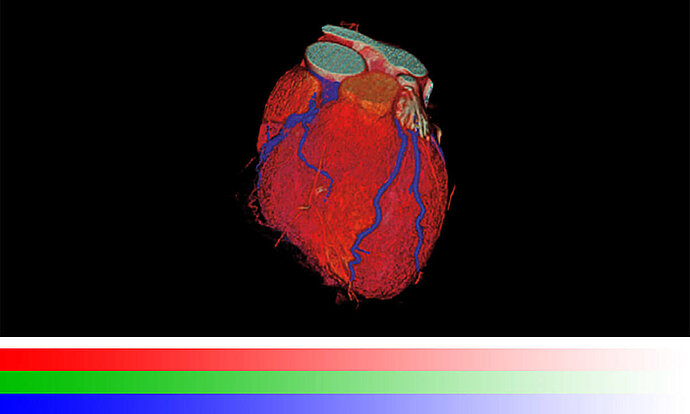
Met 13-bit-LUT
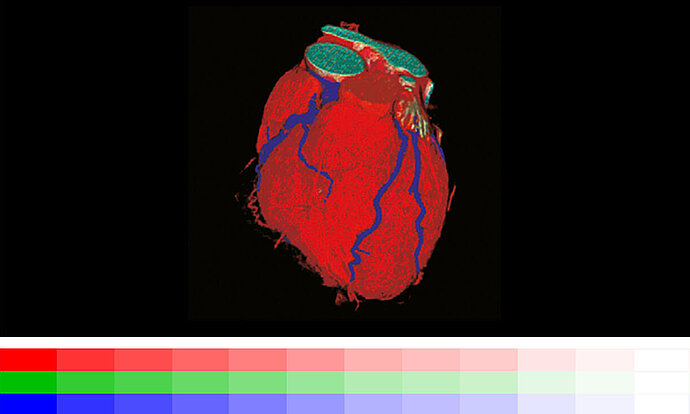
Zonder 13-bit-LUT
Consistente beeldkwaliteit dankzij geïntegreerde luminantiesensor
De nauwkeurige kalibratie van witpunt en tonaliteitscurve is gegarandeerd dankzij een in het frame geïntegreerde luminantiesensor. Deze meet helderheid en grijswaarden en kalibreert de monitor zelfstandig conform de DICOM®-standaard. De sensor werkt automatisch, zonder daarbij het zichtveld van de monitor te beperken. U bent minder tijd kwijt aan onderhoud en kunt vertrouwen op een constant hoge beeldkwaliteit.
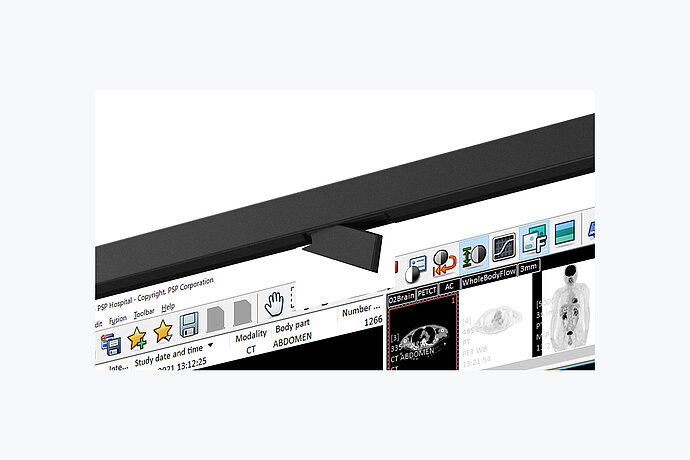
Voorbeeld afbeelding
FDA-vrijgave
Het beeldscherm bevat de FDA-510(k)-vrijgave voor algemene radiografie, maar ondersteunt geen weergave van mammografiebeelden voor de diagnose.
Vermindering van onscherpte
LCD-panels met een hoge helderheid geven afbeeldingen door overbelichting vaak onscherper weer dan het origineel. EIZO biedt daarom een in de monitorhardware geïntegreerde functie voor de vermindering van onscherpte. Deze functie zorgt ervoor dat de details die in de onscherpe randen zijn verdwenen, weer in maximale helderheid op het beeldscherm worden weergegeven.
Gelijkmatige verlichting en zeer zuivere kleuren
De monitor blinkt uit met een hoge kleurnauwkeurigheid en uniforme verlichting. Dit wordt gegarandeerd door de Digital Uniformity Equalizer (DUE), die onregelmatigheden pixel voor pixel automatisch corrigeert. Grijs- en kleurtinten van radiologische en andere medische beelden worden correct gereproduceerd op het volledige schermoppervlak. Dit is essentieel voor een nauwkeurige beeldweergave.
Constante helderheid tijdens het gebruik
Een sensor voor de achtergrondverlichting bepaalt continu de luminantie van de monitor. Het voordeel: De ingestelde en gekalibreerde waarden worden enkele seconden na inschakeling al exact weergegeven en blijven gedurende de volledige bedrijfsduur constant. De sensor is onzichtbaar in de monitor geïntegreerd.
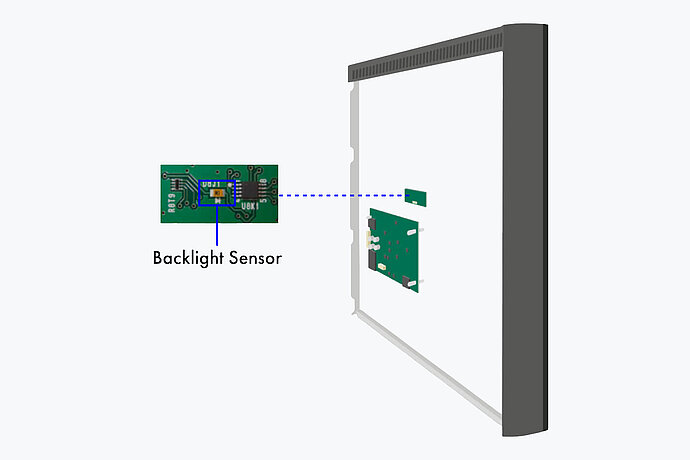
Achterkant van het beeldscherm
Betrouwbare helderheid
Wij van EIZO zijn overtuigd van de kwaliteit van onze producten. Daarom valt ook de helderheidsstabiliteit onder de garantie op de monitoren.
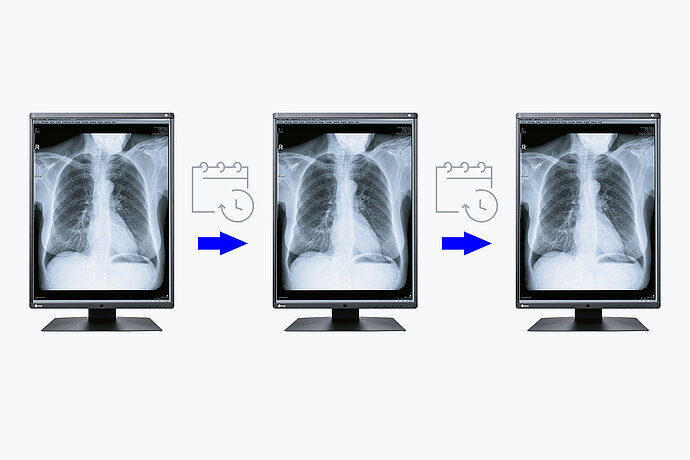
Diagnosecomfort
Efficiency bij de diagnose
Ideaal design voor de diagnoseomgeving
De smalle, zwarte bezels aan de voorzijde zijn ideaal voor gebruik in een donkere omgeving. Zo kan de gebruiker zich gemakkelijker concentreren op de weergave. De witte bezel aan de zijkant van de monitoren zorgt op zijn beurt voor een frisse, strakke vormgeving.
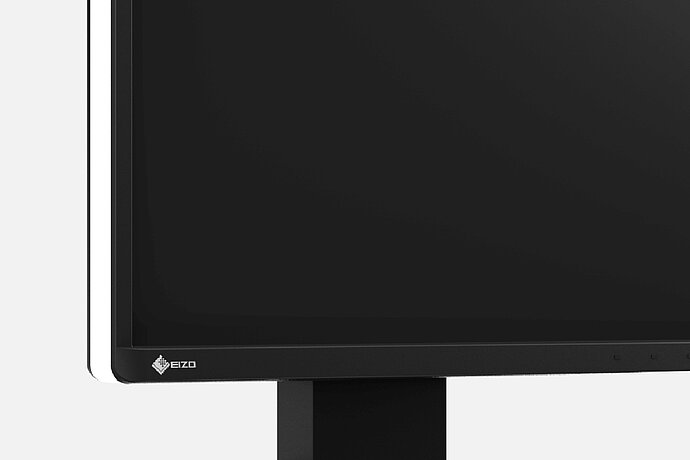
Omgevingslichtsensor ondersteunt constantheidstests
De in de monitor geïntegreerde sensor wordt gebruikt om het omgevingslicht te meten en kan worden gebruikt voor constantheidstests. De heersende verlichtingssterkte kan worden bepaald door de omgevingslichtsensor met de optionele RadiCS software.
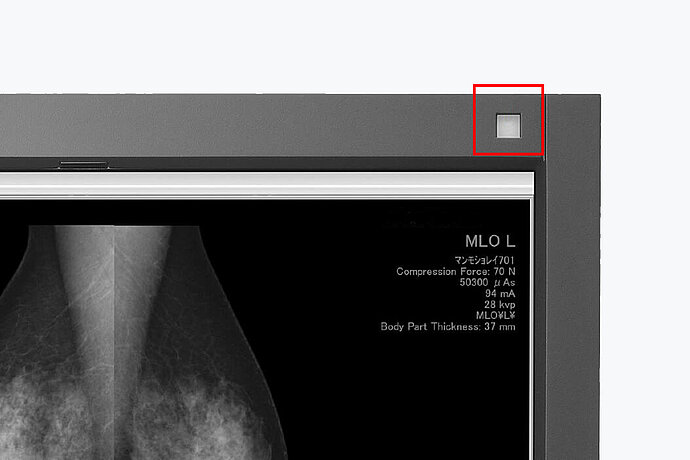
Geoptimaliseerde werkprocessen
De Multi-Modality-monitor RX660 kan 6 Megapixels (kleuren) aan beeldgegevens weergeven – zonder de storende frames die bij configuraties met meerdere beeldschermen onvermijdelijk zijn. Deze Multi-Modality-oplossing biedt zeer veel ruimte voor de parallelle weergave van alle benodigde weergavetoepassingen. Ook verbetert deze de werkprocessen in de radiologie en de totale efficiëntie op de werkplek.
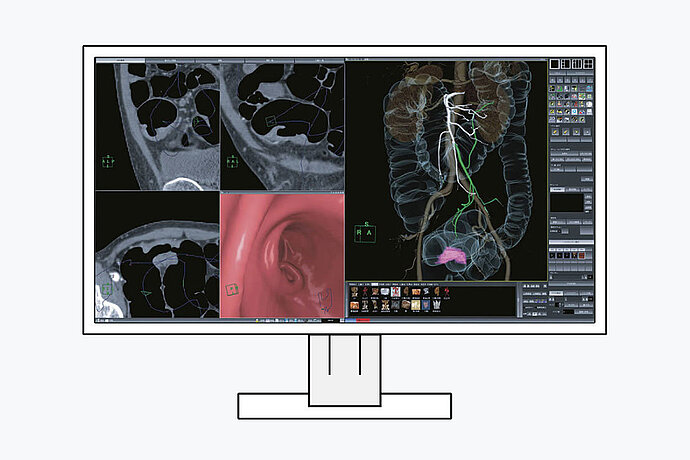
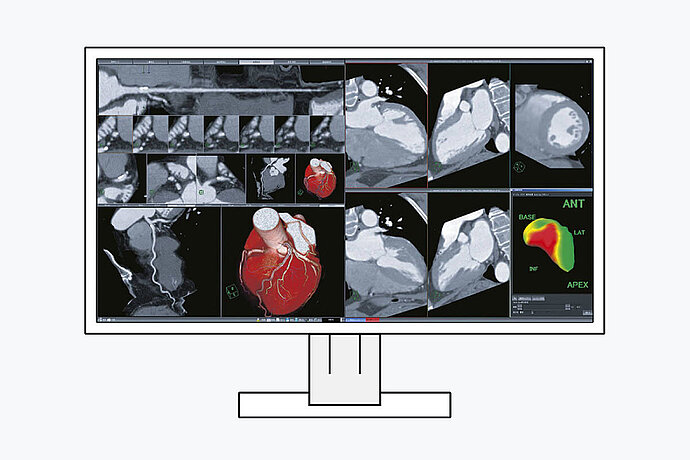
Daisy-chain-methode
Efficiënte opstelling met meerdere monitoren
Via de signaalin- en uitgang kunt u meerdere RadiForce-monitoren met de DisplayPort-interface aan elkaar koppelen. Zo kunt u multischermoplossingen zeer eenvoudig realiseren, zonder een wirwar aan kabels.
Energie besparen bij afwezigheid
Aanwezigheidssensor
Dankzij een aanwezigheidssensor bespaart u energie en beschermt u het milieu. De sensor registreert of er iemand achter het beeldscherm zit of niet. Zodra de persoon de werkplek verlaat, schakelt het beeldscherm uit. Komt de persoon terug, dan schakelt het weer in - volledig automatisch, zonder dat de muis of het toetsenbord hoeven te worden aangeraakt. Het beeldscherm is altijd klaar voor gebruik, zonder wachttijd.
Verlengde gebruiksduur dankzij automatisch uitschakelen
De monitor is voorzien van een functie voor het automatisch uitschakelen van de achtergrondverlichting (Backlight Saver). Daardoor wordt de gebruiksduur verlengd. Net als bij een screensaver worden de leds uitgeschakeld als het beeldscherm niet meer wordt gebruikt.
De Backlight Saver is onderdeel van de software RadiCS.
RadiLight: Comfortverlichting van EIZO is vriendelijk voor de ogen
EIZO presenteert de nieuwe RadiLight, een speciale, gebruiksvriendelijke comfortverlichting voor radiologen, die in donkere verslagruimten werken. Het zachte licht achter de monitor voorkomt een overmatige inspanning van de ogen, die zich normaal gesproken snel voor kan doen als de ogen in een donkere omgeving met een licht monitorscherm continu wisselen tussen licht en donker.
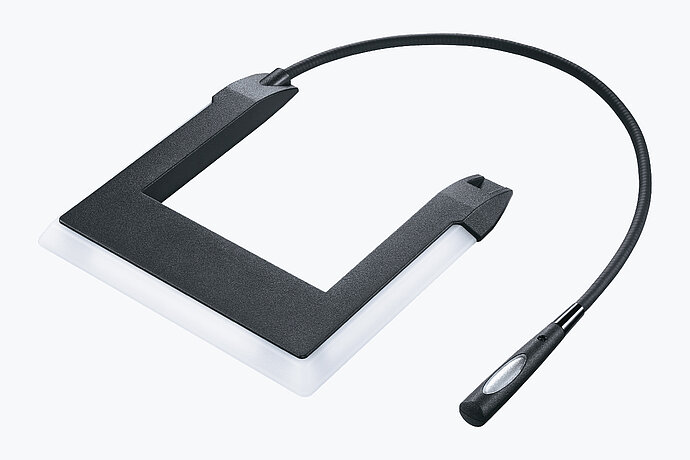
Software en bedieningsgemak
De uitrusting om comfortabel te werken
De Work & Flow-technologie
Met de toenemende digitalisering van modaliteiten worden radiologen geconfronteerd met een groeiende hoeveelheid informatie op hun scherm. Dankzij de unieke work-and-flow-technologie van EIZO met nieuwe functies die zijn afgestemd op de behoeften van radiologen, wordt de complexiteit van gegevens effectief tegengegaan. Met RadiForce RX660 en de meegeleverde RadiCS-LE-software profiteert u van de Work & Flow-functies.
Point-and-Focus: concentratie op het analysebereik
Met de Point & Focus-functie kunt u relevante beeldgebieden snel met de muis of het toetsenbord selecteren en scherpstellen. Door middel van helderheid en grijswaarde worden omringende zones verduisterd, waardoor interessante beeldgebieden beter naar voren komen.
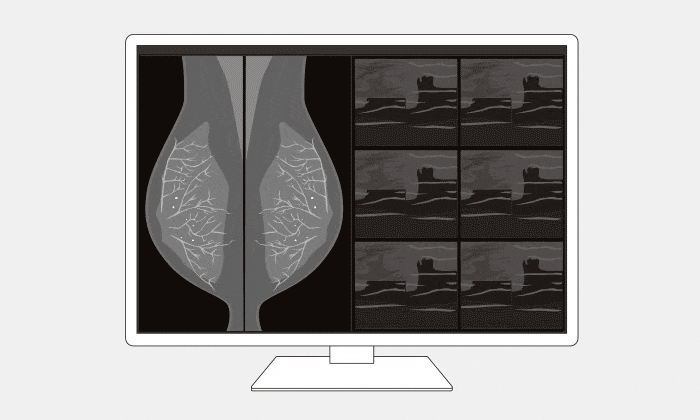
Hide-and-Seek: snel informatie oproepen
Met Hide & Seek heeft u rapporten, patiëntendossiers en andere informatie snel en efficiënt binnen handbereik, zonder dat u een extra monitor nodig heeft. Als u simpelweg de cursor naar een hoek van het beeld beweegt, wordt informatie met behulp van picture-in-picture weergegeven of weer verborgen.
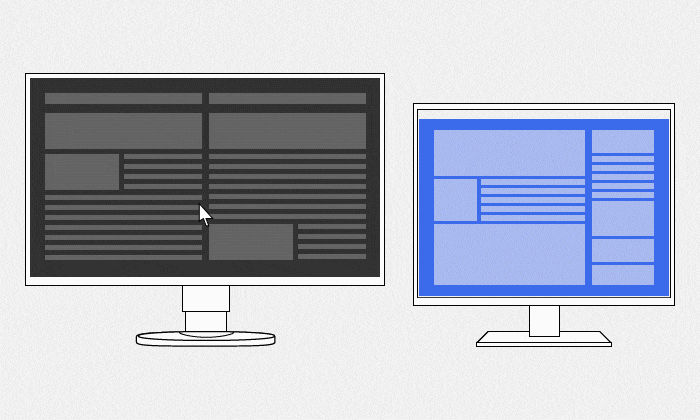
Switch-and-Go: één muis en één toetsenbord voor twee systemen
Als het diagnostische station met twee computersystemen werkt, zorgt Switch & Go ervoor dat u maar één set randapparatuur nodig heeft. Door de muis eenvoudig tussen de beeldschermen heen en weer te bewegen, kunt u beide computers afwisselend bedienen. Dit vergroot de efficiëntie en maakt uw werkplek overzichtelijker.
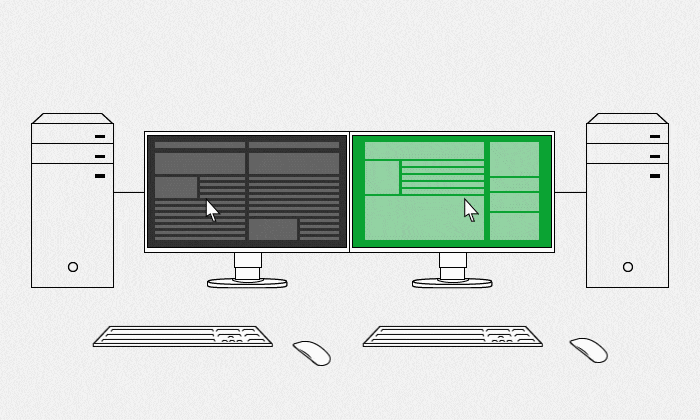
Picture-by-Picture: alles op een rij
Met de modus Picture-by-Picture kunt u verschillende signaalbronnen naast elkaar weergeven op één monitor. Hierbij kunt u zelf bepalen welk signaal er op de linkerhelft van het display wordt weergegeven, en welk signaal rechts.
Gebruik de modus Picture-by-Picture bijvoorbeeld als u twee computers wilt aansluiten op één monitor, of als u twee losse monitoren voor een computer wilt vervangen door één grotere monitor.
Duurzaamheid
Milieu- en sociaal bewuste productie
Maatschappelijk verantwoorde productie
De RX660 wordt op een maatschappelijk verantwoorde manier vervaardigd. Onze productie is vrij van kinderarbeid en dwangarbeid. De leveranciers in de volledige leverketen zijn zorgvuldig geselecteerd en zijn ook verplicht om op een maatschappelijk verantwoorde manier te produceren. Dit geldt vooral voor de zogeheten conflictmineralen. Ieder jaar dienen we vrijwillig een uitgebreid rapport in over onze maatschappelijke verantwoordelijkheid.
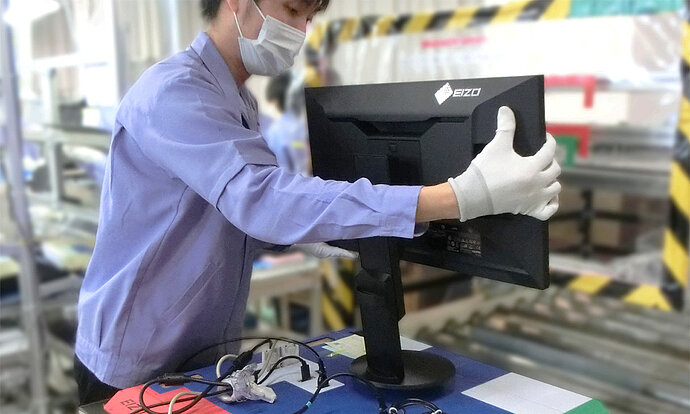
Milieu- en klimaatvriendelijk
Iedere RX660 wordt in onze eigen fabriek geproduceerd. Onze fabriek werkt met een milieu- en energiebeheersysteem conform ISO 14001 en ISO 50001. Dit omvat onder andere maatregelen voor de vermindering van afval, afvoerwater, uitstoot en verbruik van grondstoffen en energie. Ook wordt milieubewust gedrag van de medewerkers gestimuleerd. We leggen jaarlijks openbaar verantwoording af over deze maatregelen.
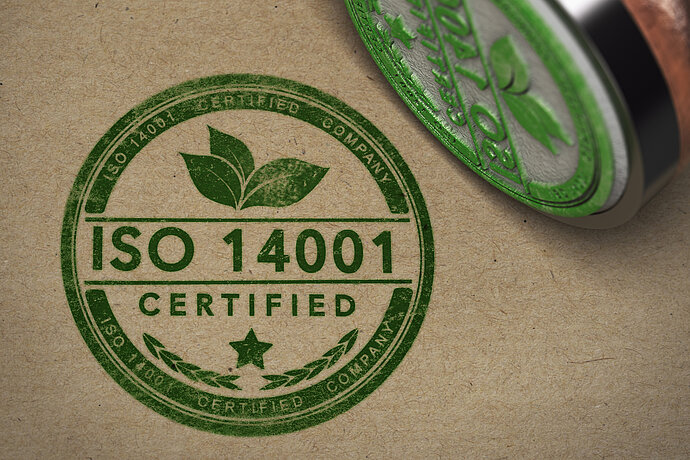
Duurzaam en met een lange levensduur
De RX660 is ontwikkeld voor een lange gebruikslevensduur – in het algemeen veel langer dan de garantieperiode. Vervangende onderdelen blijven nog vele jaren beschikbaar, nadat de monitor uit productie is genomen. De volledige gebruikslevensduur houdt rekening met de effecten op het milieu, omdat duurzaamheid en reparatiemogelijkheden de natuurlijke hulpbronnen beschermen en daarmee ook het milieu. Bij het ontwerp van de RX660 hebben we veel aandacht besteed aan een laag grondstoffenverbruik, met hoogwaardige componenten en materialen, en een zorgvuldige verwerking in de productie.
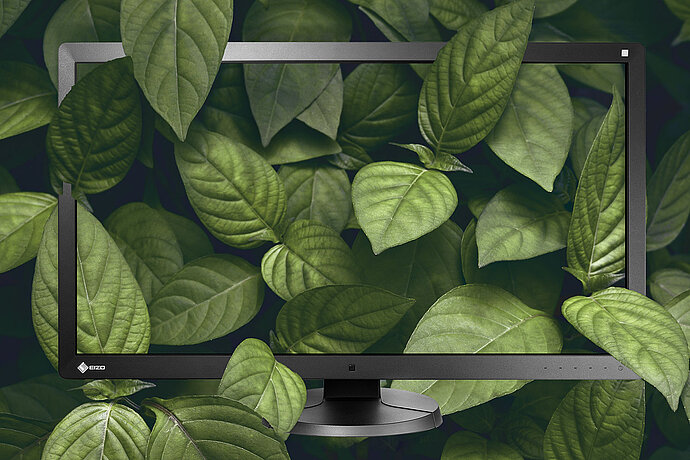
Garantie
Maximale investeringszekerheid
Vijf jaar garantie
EIZO biedt vijf jaar garantie inclusief on-site omruilservice. Wij kunnen dit bieden dankzij een ingenieus productieproces, dat is gebaseerd op een eenvoudige succesformule: doordachte en innovatieve techniek, gefabriceerd met high-end-materialen.

Advies over grafische kaarten
Voor nauwkeurige diagnoses
EIZO Grafische kaart MED-XN63
De EIZO grafische kaart ondersteunt de eigenschappen, functies en instellingen van de RadiForce RX660 optimaal. Het maakt nauwkeurige rapportage mogelijk en kan meerdere monitoren tegelijk aansturen. EIZO biedt technische ondersteuning en garantieservice voor de grafische kaart.
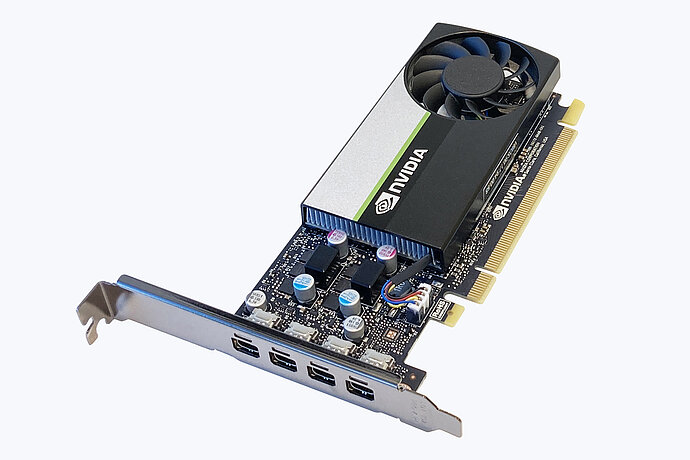
Passende accessoires
Mist u nog iets?
Technische gegevens
| Algemeen | |
|---|---|
| Artikelnr. |
RX660
|
| Behuizingskleur |
Tweekleurig, zwart-wit
|
| Toepassingsgebied | Medisch |
| Productlijn | RadiForce |
| Toepassingsgebied | Projectieradiografie, Pathologie, (bij gebruik van EIZO-monitoren voor pathologie wordt aanbevolen om het hele systeem inclusief de scanner te evalueren) |
| Scherm | |
|---|---|
| Diagonaal [in inch] | 30 |
| Diagonaal [in cm] | 76 |
| Formaat | 16:10 |
| Zichtbare beeldgrootte (breedte x hoogte) [in mm] | 645,5 x 403 |
| Resolutie in megapixel | 6 Megapixels (kleuren) |
| Ideale en aanbevolen resolutie | 3280 x 2048 |
| Pixelafstand [in mm] | 0,2 x 0,2 |
| Ondersteunde resoluties | 3280 x 2048 |
| Panel technologie | IPS |
| Max. kijkhoek horizontaal | 178 |
| Max. kijkhoek verticaal | 178 |
| Weergavekleuren of grijswaarden | 1,07 miljard kleuren (DisplayPort, 10 bit), 16,7 miljoen kleuren (DVI, 8 bit), 16,7 miljoen kleuren (DisplayPort, 8 bit) |
| Kleurenpalet/Look-Up-Table | 543 miljard kleurgradaties / 13 bit |
| Max. helderheid (standaard) [in cd/m²] | 1000 |
| Aanbevolen helderheid [in cd/m²] | 500 |
| Max. darkroomcontrast (standaard) | 1500:1 |
| Backlight | LED |
| Functies en bediening | |
|---|---|
| Vooraf ingestelde kleur-/grijswaardenmodi | 2x manuele geheugenplaatsen, Text, sRGB, DICOM |
| DICOM curve | |
| Hardwarekalibratie van helderheid en luminantiecurve | |
| Sensoren | Omgevingslichtsensor, Aanwezigheidssensor |
| Beeld-voor-beeld | |
| On-Screen menu talen | de, en, fr, es, it, se |
| Instelmogelijkheden | DICOM- kleurtooncurven, Helderheid, Gamma, Kleurtoon, Kleurverzadiging, Resolutie, Schaling, OSD-taal |
| Button Guide | |
| Geïntegreerde voeding | |
| Aansluitingen | |
|---|---|
| Signaalingangen | 2x DisplayPort (HDCP 1.3), DVI-D (HDCP 1.4) |
| Signaaluitgangen | 1x DisplayPort (HDCP 1.2) |
| Geschikt voor daisy-chain | |
| USB-specificatie | USB 2 |
| USB-upstream-poorten | 2 x type B |
| USB-downstream-poorten | 3 x type A |
| Grafisch signaal | DVI Single Link (TMDS), DisplayPort |
| Energie informatie | |
|---|---|
| Frequentie | Digital: 31-127 kHz/22-61 Hz; Sync Mode: 29,5-30,5 Hz/59-61 Hz |
| Energieverbruik (standaard) [in watt] | 93 |
| Maximaal energieverbruik [in watt] | 190 (bij maximale helderheid en gebruik van alle signaal- en USB-poorten) |
| Energieverbruik (Stand-by) [in watt] | 1.6 |
| Energieverbruik als netschakelaar is uitgeschakeld [in watt] | 0 |
| Voeding | AC 100-120 V / 200-240 V, 50/60 Hz |
| Afmetingen & gewicht | |
|---|---|
| Afmetingen (incl. standaard) (breedte x hoogte x diepte) [in mm] | 682,5 x 490,5-590,5 x 225 |
| Gewicht (incl. standaard) [in kg] | 14.2 |
| Gewicht (zonder voet) [in kg] | 10.1 |
| Technische tekening (PDF) | Technische tekening (PDF) |
| Draaibaarheid van de standaard [in °] | 70 |
| Kantelbaarheid voor/achter [in °] | 5 / 30 |
| Verstelbaarheid in hoogte [in mm] | 100 |
| Gatafstand | 100 x 100 |
| Certificering & normen | |
|---|---|
| Certificering | CE (Medical Device), ANSI/AAMI ES60601-1, CSA C22.2 Nr. 601-1, EN60601-1, IEC60601-1, RCM, FCC-B, CAN ICES-3 (B), VCCI-B, RoHS, WEEE, China RoHS, CCC, EAC |
| Software & Accessoires | |
|---|---|
| Bijbehorende software en verdere accessoires beschikbaar als download | RadiCS LE |
| Meegeleverde accessoires | 2x Signaalkabel DisplayPort - DisplayPort, 1x korte DisplayPort - DisplayPort signaalkabel, 2x USB-kabel (type A - type B), Signaalkabel DVI-D - DVI-D, Handleiding via download, Voedingskabel |
| Optionele accessoires | RadiNET Pro, RadiCS (UX2-Kit), RadiLight |
| Aanbevolen grafische kaart | MED-XN63 |
| Garantie | |
|---|---|
| Garantieperiode | 5 jaar |
| Type garantie | Omruilservice op locatie |
| Inbegrepen garantie | De garantie dekt bovendien normale slijtage van de achtergrondverlichting bij een aanbevolen maximale helderheid van 500 cd/m2 en een witpunt van 7.500 K. EIZO garandeert deze helderheid voor een periode van 5 jaar vanaf de aankoopdatum of voor 20.000 bedrijfsuren, afhankelijk van wat het eerst gebeurt. Met een maximale helderheid van 400 cd/sqm neemt het aantal bedrijfsuren toe tot 30.000. |
Downloads en ondersteuning
Rondom uw product
Handleidingen & documenten
Software
Veelgestelde vragen
Garantie
Handleidingen & documenten
Handleiding - RX660
Datasheet - RX660
Product afbeeldingen RX660
Recommended graphics cards for RadiForce monitors
RadiForce Brochure
(Engels)
Software
Stuurprogramma - RX660
Monitortest
Met behulp van door EIZO zelf ontwikkelde software kunt u snel en eenvoudig de eigenschappen en instellingen van uw eigen monitoren testen.
RadiCS
Met de software van EIZO kunt u het volledige kwaliteitsbeheerproces aansturen - van de kalibratie en het asset-management tot aan de overdrachts- en consistentiecontrole.
RadiCS LE
RadiCS LE is kwaliteitsmanagementsoftware waarmee u EIZO RadiForce-monitoren kunt kalibreren en kalibratiegegevens kunt beheren.
RadiNET Pro
Speciale software van EIZO voor netwerkondersteund kwaliteitsbeheer in grote installaties. Met functionaliteit voor externe bediening van monitoren.
Veelgestelde vragen
EIZO RadiForce-monitoroplossingen zijn speciaal ontwikkeld en ontworpen voor gebruik in de digitale radiologie.
In de hier gelinkte video leert u wat u moet overwegen bij het kiezen van een diagnostische monitor en hoe een typisch diagnostisch werkstation in de digitale radiologie eruit kan zien. Aan de hand van het voorbeeld van de RadiForce RX370 laten wij u zien welke voordelen de oplossingen van EIZO bieden.
RadiForce beeldschermen voor radiologische rapportage
EIZO heeft speciaal voor de kwaliteitsborging bij beeldweergaveapparaten uit de RadiForce-serie die worden gebruikt in medische toepassingen de software RadiCS ontwikkeld. Deze softwaresuite omvat uitgebreide testen en functionaliteit voor automatische aanpassing, waardoor een constante en consistente beeldweergave op alle RadiForce-monitoren kan worden gewaarborgd. De software doorloopt automatisch de testafbeeldingen waardoor metingen en evaluaties in overeenstemming met het beleid kunnen worden uitgevoerd, en tijd en kosten bespaard worden. Meetresultaten worden bijvoorbeeld automatisch opgeslagen in documentatie en worden gearchiveerd, en kunnen dan met de optionele software RadiNET Pro centraal worden beheerd en verwerkt. Ook is de software voorzien van een agenda met herinneringsfunctie zodat controles regelmatig en tijdig worden uitgevoerd. Om de luminantie te kunnen meten, met inbegrip van de sluierluminantie, is een geschikt meetapparaat vereist. RadiCS is in staat om de meetwaarden te lezen van de meest uiteenlopende luminantiemeters.
Volgens het ministerie van Milieu, Natuurbescherming en Nucleaire Veiligheid (BMU) is de richtlijn aangaande de kwaliteitsborging conform de Röntgenverordening (QS-RL): “Uitvoering van kwaliteitsborging bij röntgeninstallaties die worden gebruikt voor onderzoek en de behandeling van mensen“ normbepalend.
De norm DIN V 6868-157 reguleert de overdrachtscontrole en de consistentiecontrole van beeldweergavesystemen voor radiografie om de daarvoor vereiste beeldkwaliteit te waarborgen.
Afhankelijk van het onderzochte lichaamsgebied en de toegepaste methodiek zijn verschillende RadiForce-beeldschermen geschikt voor beeldweergave conform DIN 6868-157. Aan de hand van EIZO's software voor kwaliteitsborging RadiCS kunnen deze vereisten worden onderverdeeld in de klassen I tot en met VIII. In de volgende tabel kunt u een overzicht bekijken van alle geschikte beeldschermen.
Let op: Voor elk beeldweergavesysteem dat wordt gebruikt voor diagnosticering conform DIN 6868-157, moet een overdrachtscontrole worden uitgevoerd.
Afhankelijk van het onderzochte lichaamsgebied en de toegepaste methodiek gelden conform DIN 6868-157 verschillende minimumvereisten voor weergaveapparatuur. Aan de hand van EIZO's software voor kwaliteitsborging RadiCS kunnen deze vereisten worden onderverdeeld in de klassen I tot en met VIII. In de volgende tabel kunt u een overzicht bekijken van alle afzonderlijke klassen en de bijbehorende minimumvereisten.
Let op: Voor elk beeldweergavesysteem dat wordt gebruikt voor diagnosticering conform DIN 6868-157, moet een overdrachtscontrole worden uitgevoerd.
Het wordt aanbevolen om uw monitor regelmatig te reinigen. Hierdoor ziet de monitor er niet alleen als nieuw uit, maar wordt ook de levensduur en de bruikbaarheid verlengd. U kunt de behuizing en het LCD-schermoppervlak reinigen zoals hieronder wordt beschreven:
BELANGRIJK: Gebruik nooit thinner, benzeen, alcohol (ethanol, methanol of isopropanol), schuurmiddelen of andere sterke oplosmiddelen, want deze kunnen schade aan de behuizing of het LCD-scherm veroorzaken.
Behuizing
Vlekken op de behuizing kunt u verwijderen door deze weg te vegen met behulp van een zachte, licht bevochtigde doek en een mild reinigingsmiddel. Spuit in geen geval was of andere reinigingsmiddelen rechtstreeks op de behuizing. (Raadpleeg de handleiding voor gedetailleerde informatie)
LCD-scherm
Gebruik voor reiniging van het schermoppervlak een zachte doek (bijvoorbeeld een katoenen doek of een brillenpoetsdoekje). Hardnekkige vlekken kunnen meestal worden verwijderd door de doek met wat water te bevochtigen.
Voor de meest nauwkeurige beeldweergave zijn een homogene luminantieverdeling en een goede kleurechtheid van essentieel belang. Hiervoor zorgt ons DUE-circuit, de Digital Uniformity Equalizer. Deze speciale functionaliteit corrigeert bij elke tonaliteit en over het gehele beeldoppervlak automatisch oneffenheden van de luminantie en chrominantie, pixel voor pixel.
De looptijd van de garantie op EIZO RadiForce-monitoren bedraagt voor de meeste modellen 5 jaar, en deze garantie is inclusief on-site omruilservice. EIZO beveelt voor medische beeldschermen een helderheid aan die ruim boven de minimumvereisten conform QS-RL ligt. Deze aanbevolen helderheid wordt door EIZO gegarandeerd.
Welke garantie voor elk RadiForce-model van toepassing is, is te vinden in de bijbehorende productinformatie die bij elk model wordt meegeleverd.
Via de installatiewizard voor RadiCS 5 en met de daarvoor bestemde functie in RadiNET Pro wordt een gegevensmigratie voor u verzorgd.
Let wel: u moet daarvoor minstens RadiCS 4-versie 4.6.1 hebben. Hebt u een oudere versie van RadiCS 4? Voer dan eerst een update uit.
Garantie
EIZO biedt een garantie van maximaal vijf jaar, maar voor sommige producten geldt een andere garantietermijn. De exacte garantietermijnen voor elk product vindt u in de bovenstaande garantievoorwaarden, in het gegevensblad of op de internationale EIZO-website. De lange garantietermijnen worden mogelijk gemaakt door een hoogontwikkeld productieproces dat is gebaseerd op een eenvoudig succesprincipe: geavanceerde en innovatieve monitortechnologie, vervaardigd van hoogwaardige materialen. Voor u betekent de 5 jaar garantie een hoge mate van investeringszekerheid en besparing op vervolgkosten (total cost of ownership), die zonder garantieservice bijvoorbeeld voor onderhoud en reparaties zouden ontstaan.
